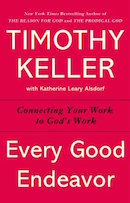Fruitful Living, Part 3
Daily Reflection / Produced by The High Calling
For you were once darkness, but now you are light in the Lord. Live as children of light (for the fruit of the light consists in all goodness, righteousness and truth) and find out what pleases the Lord.
Ephesians 5:8-10
According to Ephesians 5:9, "the fruit of the light consists in all goodness, righteousness and truth." In yesterday's reflection, we saw that God is good, righteous, and true. Thus, we are called to be like God. When we allow God, who is light, to fill us, we will bear fruit that is godlike. As people of "goodness, righteousness and truth," we will live fruitfully, contributing to the harvest of God in the world.
Today, I want to focus our attention on one little word, a word that could be easily overlooked, a word that has the potential to change your life. I'm talking about the word "all." Did you notice it in the phrase "all goodness, righteousness and truth"? It's there, and it makes a world of difference, yes, a world of difference (pun intended).
In the original Greek of this verse, the word "all" could modify only the word "goodness." But it makes more sense, grammatically and theologically, to read "all" as covering all three of the following nouns. Paul is saying that the fruit of the light consists in all goodness, all righteousness, and all truth. Not just some goodness, some righteousness, and some truth, but all of all three.
Why might this use of "all" change your life? Because many of us have been led to believe that only certain kinds of goodness, righteousness, and truth really matter to God and really make a difference in the world. Religious deeds fall into this category. What really counts in your life is doing things like going on mission trips, feeding the hungry at a homeless shelter, supporting ministries of justice, sharing the Gospel with your coworkers, being a pastor, or other such "spiritual" activities. Now, these surely should be included within "all goodness" etc. But they do not have any more intrinsic goodness than other more "secular" actions: making a fair bank loan, teaching children at school, serving on the city council, treating your coworkers kindly, designing an excellent bridge, conducting a scientific experiment, and so forth. We have the potential to be fruitful, to do what is good, right, and true, in every facet of our lives. The division between the sacred and the secular, or, as it's sometimes described today, the spiritual and the ordinary, does not reflect the truth that our fruitfulness includes all goodness, righteousness, and truth. What we do in this world and for this world matters. Like I said, "all" makes a world of difference.
Today, as you go about the business of your day, by all means pray for your colleague at work, gather with other believers in a small group, or help out your needy neighbor. But let God's light in you be expressed in all goodness, righteousness, and truth. Live as a child of light in your work, shopping, commuting, studying, playing, talking, listening, and eating. Offer all that you do to the Lord as worship. Let your all be a meaningful part of God's fruitful work in the world.
QUESTIONS FOR FURTHER REFLECTION: Do you tend to divide life up into "spiritual" things so that really good and "ordinary" things are less good? Why? Where did you get this way of thinking? If the fruit of the light actually consists in all goodness, all righteousness, and all truth, what difference might this make in how you live and think and feel today?
PRAYER: Gracious God, thank you for creating this world and all that is in it. Thank you for caring about this world and calling us to be fruitful within it. Thank you for shining your light in us so that we might bear fruit in all we do. Yes, in all we do.
Help me, Lord, to see my life as one large offering to you. May I serve you in everything I do. May I learn to see all of life as a context for worship, faithfulness, and goodness. By your grace, may I live as a child of light today in everything I do. To you be all the glory! Amen.
______________________________
Preventing Burnout
Research shows that those most vulnerable to occupational burnout are individuals who are highly motivated and strongly invested in their work. When work is an important source of finding meaning, frustrations that arise from unmet goals and expectations in the workplace can permeate all of life. This can lead to a general sense of exhaustion, cynicism, and feelings of reduced efficacy. In The High Calling series Preventing Burnout, we're talking about how faith can make a difference. We hope you find this conversation helpful and if so, will consider inviting others to join in the discussion by sharing these stories via email, Facebook, Twitter, or networks you are part of.
Featured image above by Photo Fiddler. Used with Permission. Via Flickr.






